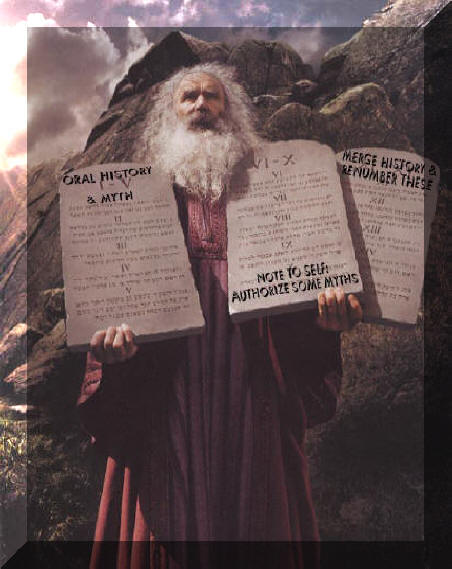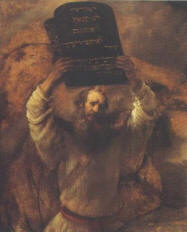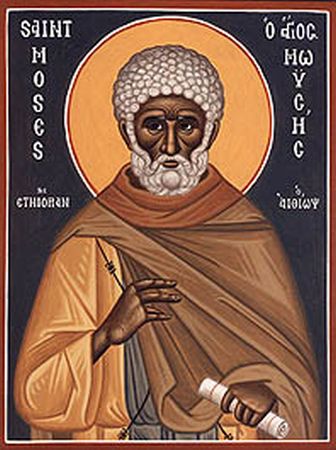
Exodus Home Page: Moses

Surprisingly, most of us know little about the epic "hero" of the Hebrew Scriptures, Moses. Judaism, Christianity, and Islam all recognize the prophet Moses and his importance to their respective faiths. Yet, when put to the test, few can identify the events concerning his life, the events that brought him to the fore as the Israelites' savior, or what his legacy meant after his death.
Moses failed to recognize that he came from Israelite stock, that he had living kin he didn't recognize, or even recognize the god with whom he spoke when called to his mission. After all, five hundred years had passed since Joseph gained prominence in Egypt and then called his family to join him when a drought brought ruin and starvation to his kin still in the Canaanite region, which would one day become the Promised Land of the Israelites.
Moses represents the last in a preceding line of God's chosen voices for his
people; in fact, Yahweh most often spoke directly with those He chose, doing so
with Moses, but refraining from direct discourse after the prophet's death.
One can return to the Garden and find where Yahweh speaks, or even walks, with
his creations; however, the head/heel trope that Yahweh speaks with regard to
the Serpent--"he shall strike at thy heel, and you will strike at his head"
(which Martin Luther noted
 as the first reference to the Biblical prophecy of
Christ's emergence for salvation)--begins the slow decline of Yahweh's direct
involvement with humanity, or God's descent to earth in order to manifest
Himself or to choose His spokesman.
as the first reference to the Biblical prophecy of
Christ's emergence for salvation)--begins the slow decline of Yahweh's direct
involvement with humanity, or God's descent to earth in order to manifest
Himself or to choose His spokesman.
Slowly but deliberately, Yahweh refrains from earthly contact, except to call the chosen one to meet with Him at a designated place, which means coming up, as opposed to Yahweh's coming down. Gone are the times when Yahweh would close the door of the Ark, come down to investigate the hubristic tower built to the heavens, or to speak to all His people.
By the time of Moses, after this five-hundred year absence, Yahweh appears to Moses, with the latter having to ask who speaks to him--ayeh asher ayeh becomes the response, translated variously as "I AM THAT I AM (King James Version) to the vernacular translation of "Never mind who I am ...". When Moses and God meet, Moses alone, as opposed to his people, must come up to meet the Eternal One. Now, only one individual becomes chosen, and he, not God, makes the move, now going up as opposed to Yahweh coming down.
Moreover, Yahweh's commands must go through a translation process, so that followers have a duty to believe and to respect their chosen leaders, which in times to come will mean suspect prophets and those who have fallen from Yahweh's favor. An increase in population never becomes implied in these changes; rather, Yahweh seems to have removed the Creator's direct presence from those who obey that will or the commands given a specially chosen people.
Humanity has separated, changed its beliefs or forgotten its origins, and stands in distinct opposition from Yahweh's original intentions with regard to the Created. When Abraham first became a "called out" and specially chosen person, he had to change his ways in which, today, we could hardly fathom, given out culture and traditions. Abraham had to give up his local gods, his "gods of the tent" or those of that part of the land. Rather, he took--or Yahweh decided--to take his God with him, out of Ur to a land of various peoples and their gods as that he had left.
Having established a line of people from Abraham and his son Isaac (Ismael in Islamic belief), the most important character becomes Jacob, the crafty twin of Abraham's son. One notes a pattern here: Yahweh chooses flawed individuals to carry a message to the people: consider Jacob, whose name means "heel-sneak," and who comes into the world getting a "free-ride" by clinging to Esau's heel at their delivery. Abraham himself barters with Yahweh, as with the number of righteous individuals who may save Sodom and Gomorrah.
The list continues, with Moses, who attempts to excuse himself because of a speech difficulty or with trouble forming his thoughts and words, to those who follow--King David being the most obvious, given his many shortcomings. Yahweh's chosen always seem flawed in some manner, until we get to the Apostle Paul, whose past qualifies him but whose intellect and abilities stands apart from all who have preceded him.
Moses has the qualities of the epic hero, one who once singled out, lends his voice and actions to the establishment of a people and their destiny; yet, his flaws remain many. For Moses, in one of the two renditions of the approach to the land of Yahweh's promise, he hubristically strikes the rock in order to give water to his people in the desert, as opposed to speaking to it, as Yahweh had commanded. The failure results in his loss of seeing that land prior to death, a seemingly harsh penalty for his years of suffering and leading a disgruntled and "memory-challenged" people into the land of "milk and honey."
For his part, Moses demonstrates astounding military skills in avoiding the
Egyptian army and in dealing with unsupportive peoples along the way; his skills
at establishing a cult of personality rival anything seen in the modern era; his
determination and leadership save a people from the desert, as well as from one
another; and his patience, broken by his peoples' return to the idols of Egypt, balances a strength with propitiation that makes him legendary in the annuals of
great leaders.
balances a strength with propitiation that makes him legendary in the annuals of
great leaders.
From Yahweh's plagues on Egypt, which he announces and witnesses, his leadership in dealing with the pursuing Egyptian army, to his patient years in the wilderness that must console his people and await Yahweh's promise, Moses becomes the idealized epic hero, but one who tragically fails to realize his goal--the one he was born to finish, but which terribly, unfortunately eludes him.
The information about Moses remains extensive, to say the least, whether his calling by Yahweh, the strange passage that all disagree about, where Yahweh attempts to kill Moses in the desert (and Zapporah saves his life, but how remains unclear), to the commands that Yahweh gives to Moses and which Pharaoh rejects (because of the suggestion that Yahweh "hardens his heart"), the difficulties he has with people in the Wilderness, which becomes most apparent when Moses returns from the mountain with Yahweh's commandments, destroys them, and must return again, to the strange episode of seeing the "back" of Yahweh, or the strange episode of Balaam's ass.
To be more precise, Exodus raises more questions than answered. However, in sum the narrative represents the description of the literary definition of "Epic": a narrative that focuses upon the establishment of a people, most usually by one among them, who distances himself from their previous condition creating a new existence, now recalled in the leader's glorious struggles, bravery, and sacrifices on their behalf.
Aaron remains the question of Exodus. As the first of the Levitic tribe, the priests of Israel, one would believe him to be the focus of the book after Moses; yet, this remains untrue, given that Aaron takes part in the golden calf affront to Yahweh, and does not figure into the quest for the Promised Land as Joshua does.
Joshua remains the next and even sudden appointed by Yahweh, late in Exodus, and of course figures prominently in the taking of the former Canaanite territory. Truth to tell, the book of Joshua remains the most violent of all biblical books that comprise the Bible, coming as a surprise to those who take the time to read it, and to do so with care--although a cursory reading provides outrages enough.
 Moses
lived approximately 800 years or more (depending on one's acceptance of most
scholarship) prior to the authorship of the first scriptures, which
apparently took place at the court of Solomon, reflecting upon King David's
union of the two nations, Judah and Israel--common peoples, divided by
allegiances and powerful leaders.
Moses
lived approximately 800 years or more (depending on one's acceptance of most
scholarship) prior to the authorship of the first scriptures, which
apparently took place at the court of Solomon, reflecting upon King David's
union of the two nations, Judah and Israel--common peoples, divided by
allegiances and powerful leaders.David first united the kingdoms, moved the capital to Jerusalem, and established or made plans for a greater Temple than the previous one in the north. His son by Bathsheba, Solomon, ruled a kingdom renowned in the known world, even among the citadel of power and culture, Greece. Solomon's Temple, his cultivation of the arts, the stability he provided, and the strength of his kingdom made the oral tradition of the Hebrew people, the "Harbiru" of Cana, ripe for an "authorized," written view of their history.
The scholar Harold Bloom believes that individual to be a woman, given that they had more authority and latitude than one might expect today (consider that Deborah was a Judge of Israel--while Samuel represented the first Prophet, Priest, Judge, the order as given represented the hierarchy of authority in the first years of the kingdoms of Judah and Israel). The so-called J writer (from the German scholarship of the 19th Century, so-called the "Higher Criticism," since they took the first steps in scholarly research into the history, literature, and totality of Scripture), the writer who referred to God as Yahweh, seems to have been the first composer of Hebrew narratives. J apparently resided in the Southern Kingdom of Judah, while years later the E writer, so named for a proclivity for referring to God as Elohim ("Lord"), and one who lived in the Northern Kingdom of Israel followed, offering many of the same narratives, but with slightly different twists, results, or specifics.
Such remained the case until the Babylonian Captivity, in the 6th Century B.C.E., when a Priestly school of writers recalled their beginnings while in exile, apparently so as not to forget their heritage. The P writer offers similar narratives as J and E, but with the specifics quite different. The most obvious of these becomes evident in the opening of Genesis, whereas the newer version, P, makes its debut as the first words: "In the beginning ...". In Chapter 2, midway through verse 4 (given that the Geneva Bible in the 16th Century first delineated chapters and verses), unfortunately does not clarify the end of one version of Creation with the next. The division, however, remains clear: herein J, the first narrator appears, so that "male and female" do not occur created together on the sixth day, but Adam comes first, before all other creations, with Eve a late addition, as it were.
These many versions of narratives, when duplicated, become known as "doubles,"
and sometimes we even find "triples" of narratives (Noah and the Ark remains
another famous "double"). So, to return to Moses, we find many doubles in
the narratives that concen his guidance from Egypt into the Wilderness and then
to the edge of the Promised Land.
But if you want more to consider, take a look at Freud's Moses and Monotheism--while probably the least successful of Freud's writings, it still makes for fascinating reading.